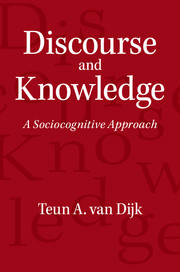Book contents
- Frontmatter
- Contents
- List of figures
- List of tables
- Acknowledgment
- 1 Introduction
- 2 Elements of a theory of natural knowledge
- 3 Discourse, knowledge and cognition
- 4 Discourse, knowledge and social cognition
- 5 Discourse, knowledge and society
- 6 Discourse, knowledge and culture
- 7 Language, discourse and knowledge
- 8 Conclusions
- References
- Index
8 - Conclusions
Published online by Cambridge University Press: 05 August 2014
- Frontmatter
- Contents
- List of figures
- List of tables
- Acknowledgment
- 1 Introduction
- 2 Elements of a theory of natural knowledge
- 3 Discourse, knowledge and cognition
- 4 Discourse, knowledge and social cognition
- 5 Discourse, knowledge and society
- 6 Discourse, knowledge and culture
- 7 Language, discourse and knowledge
- 8 Conclusions
- References
- Index
Summary
This multidisciplinary study examines the complex relationships between two fundamental notions of the humanities and social sciences: discourse and knowledge. It accounts in detail for the general insight that in order to be able to produce and understand discourse, language users need vast amounts of knowledge of the world, and that most of this very knowledge is precisely acquired by discourse.
These symbiotic relationships between discourse and knowledge have partly been studied in nearly all disciplines of the humanities and social sciences, but until now a general integrative monograph dealing with the discourse–knowledge interface was lacking. This book for the first time offers such an integrated approach by systematically examining the myriad of related aspects of discourse and knowledge as they have been studied in epistemology, cognitive and social psychology, sociology, anthropology and linguistics.
Details of these aspects have been accounted for in many thousands of works on knowledge since Antiquity, and many hundreds if not thousands of books (and even more articles) on language and discourse published since the 1960s. This book cannot possibly come even close to studying the technical details of these earlier works. On the contrary, its aim is precisely to offer a broad, multidisciplinary perspective lacking in the more detailed earlier studies. In this final chapter, we summarize some general findings of our general, integrated approach.
- Type
- Chapter
- Information
- Discourse and KnowledgeA Sociocognitive Approach, pp. 310 - 328Publisher: Cambridge University PressPrint publication year: 2014

